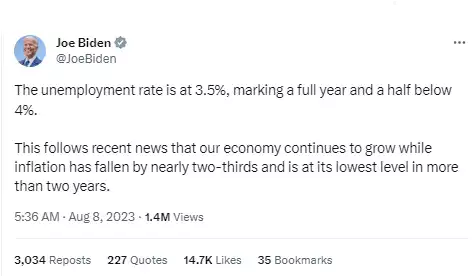The Early Returns on “Bidenomics” Are Not What They Seem
News
|
Posted 09/08/2023
|
2235
President Joe Biden's high-stakes gamble on "Bidenomics" appears to be faltering just two years into his presidency. Despite his concerted efforts to promote his sweeping economic agenda, the public remains rather sceptical.
Confidence persists within the White House that their strategy will eventually bear fruit, as an unnamed White House official asserted that "Bidenomics" will evolve to signify President Biden's vague plan of more factories, more jobs, and lower prescription drug costs, despite the inability to provide a comprehensive list of specifics.
The administration continues too aggressively claim credit for any positive economic news, ranging from declining inflation to lower unemployment. They are banking on the idea that as the economy inches forward, the public will credit "Bidenomics" for popular aspects of economic improvement.

Yesterday Biden began touting a lower official unemployment rate as supposedly another notch on his belt of economic success, however when appropriately adjusting for participation, the change in unemployment is relatively negligible.

When adjusting for the sharp increase in disability we have seen in the past year also, the numbers display a similar picture.
In an attempt to continue to sway public opinion, top officials are crisscrossing the country, showcasing projects funded by Biden's economic initiatives. The president himself is embarking on a tour to spotlight his initiatives.
However, a stark divide still persists between the statistics touting economic strength and polls reflecting public sentiment. While inflation may be officially receding and consumer confidence climbing, Biden's approval ratings in handling the economy remain alarmingly low.
People who fill their grocery carts and cars every week simply aren’t buying the Bidenomics’ narrative. In a poll done last week by CBS News, it is clear that Biden’s credibility is in trouble. His job approval rating on the economy was a mere 34%, and on inflation specifically he’s at 30% approval. Furthermore, 69% of voters said the costs of goods and services were going up not down, contrary to his current inflation thesis.
A notable portion of respondents had heard of "Bidenomics," but many associated it with inflation and tax increases. The administration's attempts to counter this perception by highlighting its alleged infrastructure and job creation have yet to gain significant traction.
We wrote yesterday about the use of oil to manipulate the inflation situation. The plummeting PMI’s across the board are debunking the manufacturing pillar of his policy and the above highlight the employment message being different to reality. If the 3 pillars are the foundation, then there appears to be a gap between narrative and reality.
As the White House and Democrats struggle to bridge the gap between positive economic indicators and public sentiment, the future of "Bidenomics" hangs in the balance. The administration is banking on the hope that press releases and tweets of positive economic indicators will win the PR battle, but the majority US citizens aren’t buying what the 46th President of the United States is currently selling.